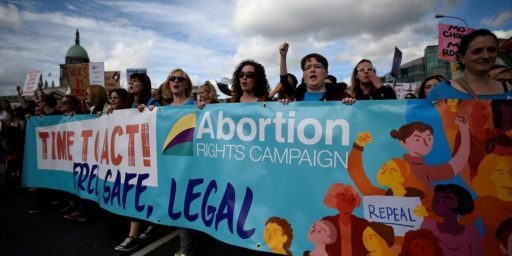Irish Voters Approve Liberalized Divorce Laws
Despite opposition from the Catholic Church, or perhaps in rebellion against it, Irish voters overwhelmingly approved a new law liberalizing that nation's divorce laws.

In yet another example of the massive cultural change that has taken place in Ireland in a short period of time, Irish voters headed to the polls last Friday to approve a referendum that will cause changes to the nation’s laws that will make it easier for people to obtain a divorce:
DUBLIN — Ireland has voted overwhelmingly to ease restrictions on divorce, taking another step toward liberalizing a Constitution that was once dominated by the teachings of the Roman Catholic Church.
Official figures released this weekend showed that 82 percent of voters in referendum on Friday approved the change, with all areas of the country voting strongly in favor.
The results of come on the heels of other major social shifts in the country: a 2015 vote to legalize same-sex marriage — the word’s first popular vote on marriage equality — and a referendum last year that repealed Ireland’s ban on abortion in almost all circumstances, including rape and incest. In October, the nation voted overwhelmingly to remove a ban on blasphemy from the Constitution.
Divorce was banned in Ireland by a 1937 Constitution strongly influenced by the Catholic hierarchy, and an attempt to overturn the ban in a 1986 referendum was soundly defeated by a 3-to-2 margin. The country made divorce legal in 1995, after a referendum deciding the issue with just over 9,000 votes of 1.63 million cast.
But the new law imposed strict conditions, including a provision that a couple must have lived apart for four of the previous five years before getting divorced.
The results of Friday’s referendum remove divorce regulations from the Constitution and place them in the hands of lawmakers. The government of Prime Minister Leo Varadkar, having consulted with other parties, said it would move to reduce the waiting period to two years.
Josepha Madigan, the current culture minister, introduced the bill for the referendum in 2016 as a backbench member of Parliament. As early counting showed strong support for the change, she told reporters: “I think it’s a really strong endorsement from the Irish people for the referendum, and it demonstrates their kindness and their understanding of the situation people find themselves in when they are separating or divorcing.”
The liberalization of the divorce process had been opposed by some Christian groups and questioned by the Catholic hierarchy. Bishop Denis Nulty, chairman of the Council for Marriage and Family for the Irish Bishops’ Conference, said that the legal changes sought to “expedite the dissolution of marriage.”
The bishop of Elphin, Kevin Doran, wrote to his congregation that “Catholic voters, like everyone else, must now consider whether the proposed constitutional change might have the effect of further weakening the social commitment to marriage.”
“The important parallel question that we need to ask,” he said, “is whether society is living up to its responsibility to prioritize the family and to provide the human supports that might help couples to resolve difficulties that arise in their relationship, before their differences become irreconcilable.”
Ireland’s liberal shift, at odds with the trends in many other Western countries, was also evident in early counts for city and county council elections and in the European Parliament elections held on the same day.
Concern about climate change and unhappiness with the Irish government’s performance on a number of issues — including housing, health and runaway spending — led support to swing toward the progressive Green Party, rather than the established center-right parties.
This vote is just the latest example of the extent to which Ireland, previously one of the most Catholic and conservative nations in Europe has changed in a very short period of time. Just about a year ago, for example, Irish voters showed up at the polls to approve a referendum that liberalized the nation’s abortion laws, previously one of the most restrictive in Europe. That move came three years to the day after voters had overwhelmingly approved a referendum legalizing same-sex marriage. Both votes were remarkable in no small part due to the fact that Ireland had once been one of the most devoutly Catholic nations in the world and had laws that largely mirrored Church teaching on social issues, including divorce which under previous law had been exceedingly difficult to obtain.
As with those previous votes, the outcome of this referendum is yet another reflection of the extent to which the political and cultural situation in Ireland has changed, especially with regard to the influence of the Catholic Church on the state and on the opinions of the general public. In some respects, those changes have happened because, like much of Europe, Ireland has become far more secular than it used to be, especially among the younger generations. Partly, one supposes, these changes can be attributed to the greater freedom of movement that Irish membership in the European Union has brought about and the ease with which Irish young men and women can move between Ireland and other parts of the E.U. where the influence of religion on politics has been on the decline for decades now. In addition to that, though, it seems clear that the Catholic Church has brought about much of this itself due to the revelations that have come out over the past decade or more regarding the same type of child abuse that has become public here in the United States as well as revelations regarding abuse of children at orphanages operated by the Catholic Church. These revelations, along with the aforementioned cultural changes, seem to have drastically reduced the influence and reputation of the Church in Irish society.
The changes in the law don’t necessarily mean that we’ll see a massive increase in the number of divorces in Ireland, in no small part because even these liberalized laws appear as though they will be more conservative than divorce law in other parts of Europe. Nonetheless, these changes will make it easier for men and women to get out of marriages that shouldn’t be held together, or which perhaps never should have been entered into at all. Additionally, it’s good to see a nation getting religion out of its politics. Maybe the Republican Party should give that a try.





I think the Catholic Church needs to recognize that their behavior in the adoption and sex scandals that have hit Ireland might have something to do with their reduced influence. Some of the stories I’ve read are horrific, and the church just swept it all under the proverbial rug.
This is what happens when an institution loses its moral authority, and frankly I am okay with it.
Many years ago I read a quote from a French Canadian woman who was expressing astonishment about what seemed to her to be the speedy disappearance of the Catholic Church from Québécois cultural life. When she was a girl and young woman going to mass was a social event, a crowded place to see and be seen, and a priest would be invited to every social event or important meeting, both to open and close with a prayer but also to weigh in on all things. And then one day she realized she hadn’t been to church in years, didn’t know the names of the priests and neither did her friends and family, even those who had grown up in the same religious air as her. The cathedrals and churches were half empty even with one or two masses on a Sunday rather than the half dozen of her youth.
A political party where a significant minority (if not an absolute majority) of its membership belongs to religious groups who have as a goal to “take over the [city/county/state/nation] for Jesus” is not likely to remove religion from its politics–or politics from its religion for that matter–any time soon.
ETA: “she realized she hadn’t been to church in years”
To me, this is the key. If religion isn’t important to her personally, why should it be important culturally? The commission is to make disciples, not control territory.
@Jen: Ireland has been Ground Zero for many horrific abuses such as Magdalene laundries and symphisiotomies, and because of how the Church in Ireland chose (is still choosing) to address such abuses (for instance, Irish taxpayers are well aware that they are picking up the tab for compensating Laundry victims and the Church outright refuses or drags its feet on paying its share, which in turn makes more headlines) and the fact that the Irish government up until just a few years ago was also perceived as being unduly influenced by and unduly soft on the Church in such abuse cases (to the point of restricting compensation to the symphisiotomy victims in such terms that no one could have ever qualified, which again just made things worse when it hit the headlines, etc.), I don’t see the Catholic Church doing anything but digging itself deeper. It’s also been tone deaf on the gay marriage debate and the abortion debate, and its role in education is increasingly being questioned.
I’m not sure if it was hubris or what, but definitely a case where the Church was in its own bubble and did not realise how much they’d been passed by (I am not downplaying how much abuse they enabled, just pointing out that they justified the abuse from within their bubble and it was not pierced until it was far too late and they were digging up bodies of infants and young women on Church grounds).
It also speaks to the role of a free press – nothing drives home the message that the Church was responsible for horrific abuses like a headline in 2017 (!) stating, “Call for Magdalene laundry sites to be searched for graves” – and the unintended consequences of repeated waves of emigration and the effect living and working abroad had on the younger generation (and from their point of view, they didn’t have much of a choice about emigrating, especially after the markets crashed in 2007-08).
@Blue Galangal: This is how organisations lose moral authority. If it wants to claim it has the right to rule over the behaviour of individuals, it had better hold itself to even higher standards and not keep finding excuses for its own prelates. As it is, the Irish Catholic church has come off as “we’ll abuse you lowly peons as much as we want, and we’ll tell you that we’re doing it in the name of God.”
No wonder everyone has been voting with their feet.
@grumpy realist: Yup, exactly. And they go and tell the little old ladies, and the Taoiseach, how to vote. And then they’re shocked that people hold them accountable for some of the country’s social (and political) ills.